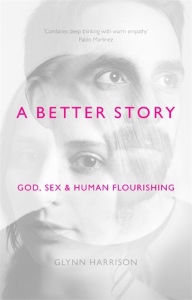A Better Story - a review
“We have a plausibility issue: what the Bible clearly teaches sounds so unreasonable to so many of us today.”[1] That comment in Ed Shaw’s book, The Plausibility Problem, could well describe the challenge that Glynn Harrison takes up A Better Story: God, Sex & Human Flourishing. The book is his attempt “to say why I think traditional Christian teaching on sex, marriage and human flourishing is good news for today” (xi).
 The sexual revolution, that is, “the overturning and liberalization of long-established social and moral attitudes to sex that began in Western culture in the 1960s, and continues to this present day” (3) has changed things dramatically. But despite this change, Harrison argues that the promises of sexual liberation, freedom and fulfilment have been found wanting. In response, the church needs to be ready to affirm the biblical view in ways that are creatively engaging, not just propositional arguments. In short, the need is to use the power of narrative to tell a better story, showing the place sex and human relationships have within the framework of the gospel.
The sexual revolution, that is, “the overturning and liberalization of long-established social and moral attitudes to sex that began in Western culture in the 1960s, and continues to this present day” (3) has changed things dramatically. But despite this change, Harrison argues that the promises of sexual liberation, freedom and fulfilment have been found wanting. In response, the church needs to be ready to affirm the biblical view in ways that are creatively engaging, not just propositional arguments. In short, the need is to use the power of narrative to tell a better story, showing the place sex and human relationships have within the framework of the gospel.
Those familiar with Harrison’s previous book, The Big Ego Trip, will find a similar structure in his argument here. First, he seeks to help the reader understand what happened, how and why the revolution came about, and why it was so effective. The second section involves a critique of the “shame and hypocrisy” (81) in the history of the church that gave rise to the promises of the revolution to be “more inclusive and life-giving than we offered in the past” (82). He also reveals the failed promises of the revolution – we are not having more and better sex, the confusion between calls for more safeguarding and yet more sex education, the brokenness of relationships and the cost that children pay for growing up in unstable households. The final part seeks to tell the better story of marriage, sex and human flourishing within the context of the gospel.
His confidence that the biblical teaching is not only true, but also good news, is much needed
There is much to commend this book. It is clear and easy to understand, even with some of the “difficult concepts in the early part of the book” (xvii), which is so important in helping orthodox Christians think, understand and try and get a foothold with the issues. The helpful summaries at the end of each chapter make an easy reference point. Harrison’s willingness to self-critique, with a whole chapter on the subject, enables us to own the mistakes of the past and not repeat them and recognise that we are all, to varying extents, sexually broken. The compassion for the poor, the marginalised, and especially children rings loud and clear both in tone and with statistics to back up the claims being made. His confidence that the biblical teaching is not only true, but also good news, is much needed. This conviction shines through and allows the book to communicate its message effectively.
It seems churlish to offer criticism of a book that has carefully walked where many fear to tread. There are one or two places where the suggestions for the better story would be vulnerable to criticism. For example, in the section 'The Institution of the family' in chapter 15, Harrison acknowledges “the agony and ecstasy of family life” (167). He admits that separation, divorce, infertility, sickness, death and family feuding are ugly realities, but goes on to comment:
The fact that we fall short of these ideals, and find those commitments so challenging, doesn’t mean they should be abandoned. There may be a thousand exceptions, but it’s still a good rule (167)
I agree with the ideal, but when one talks of “a thousand exceptions” the question must be asked: When does an exception cease to be an exception? I don’t disagree with Harrison, but the case needs strengthening to show that the institution of the family is not just a pipe dream.
I am also not convinced the section on Gnosticism in the context of radical individualism and human flourishing in chapter 2 fits the general pitch of the book. I agree with the central thesis of the section, that Gnosticism and radical individualism share the conviction that “the source of the self is found by looking within”. But I don’t think this link added much to the book. The comparison may confuse the general reader unfamiliar with Gnosticism, and frustrate the more specialist reader who would want to delve deeper into the parallels and links. But these two criticisms are minor issues.
A Better Story is timely, helpful and much-needed
A Better Story is timely, helpful and much-needed. By not delving into one specific area it helps provide a general overview and foundation which will hopefully spur others on to go into greater depth on specific issues. This book leads the way to a creative and engaging narrative showing how sex, marriage and family point us to the ultimate fulfilment of all such desires in the great marriage still to come: Christ and his church.
Title: A Better Story: God, Sex and Human Flourishing
Author: Glynn Harrison
Publisher: IVP
Publication Date: 2017
Pages: 192
Price: £9.99
References
- [1] Ed Shaw, The Plausibility Problem, (Nottingham: IVP, 2015), 25



